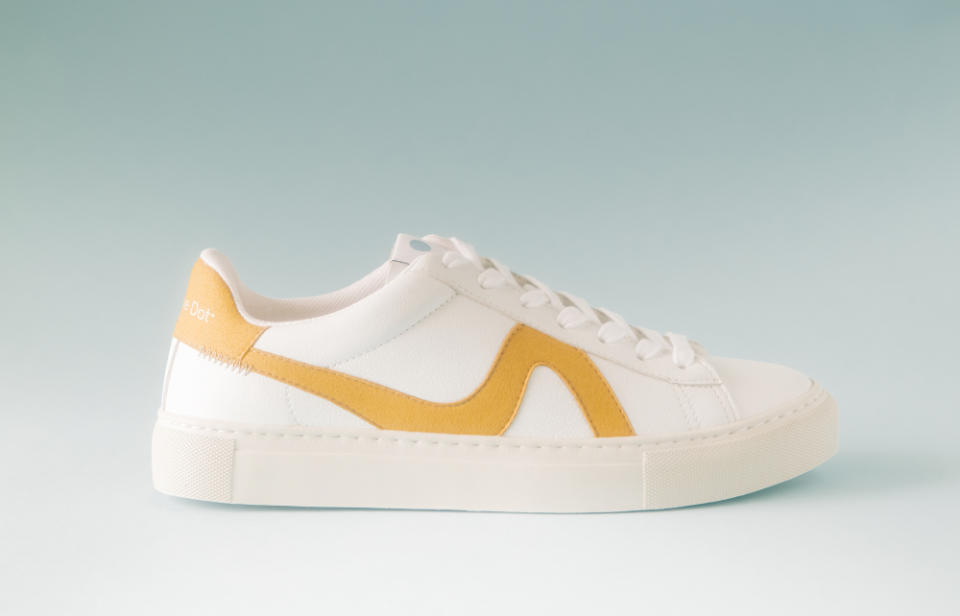Koio’s New Vegan Footwear Label Doubles as an Innovation Lab

Koio Collective is using a different kind of leather for its newest launch.
The Manhattan-based footwear brand known for producing higher-end sneakers from regenerative cow-derived leather turned to fruit waste as the base for a new shoe. It worked with Mansur Gavriel supplier Mabel Industries out of Italy to source a material made from apple industry byproducts repurposed into a fashion-friendly input. That’s the base of the shoe it’s calling the Vegan 01, whose supply chain is mostly located in Spain’s Portuguese-speaking neighbor on the Iberian peninsula, which last year banned the use of the “misleading” term vegan leather.
More from Sourcing Journal
The eight-year-old shoe company said the launch marks the inaugural offering from Pale Blue Dot, a sub-brand it bills as an internal R&D lab exploring vegan innovations hand-in-hand with suppliers.
According to Koio co-founder Johannes Quodt, who created the company in 2015 with Chris Wichert, Pale Blue Dot offers “a more accessible line that really focuses on plant-based sourcing,” responding to the challenge that “plant-based materials are not ‘there’ yet in terms of our expectations,” he told Sourcing Journal.
Koio, he continued, wants “to be part of a change that we foresee in the next 10 years toward actually sustainable materials that are on par with or better than leather, in terms of functionality and sustainability.”
Named after the phrase and iconic photograph of Earth that astronomer Carl Sagan made famous in 1990, Pale Blue Dot “reminds us of our goal” to preserve the planet that we call “home,” Quodt continued. “We hope it also inspires our customers to shop responsibly for Earth’s well-being.”
Though serving the planet is part of the sub-label’s mantra, Mabel Industries’ AppleSkin, like virtually all non-animal leather alternatives, is produced with a polyurethane coating to deliver key performance attributes. The Vegan 01’s material matrix also includes recycled rubber soles, organic cotton laces and responsibly grown cork insoles.
Koio wanted to source the shoe from a country that could match the quality coming out of Italy, which produces the rest of its footwear, while offering “more accessible” prices, and “Portugal is the place,” Quodt said. After “selecting the best materials that we could find and bring[ing] them together in a convincing package,” Pale Blue Dot’s first fruits serve up “the best in plant-based materials that you can offer at this point in time,” he added.
The company is selling the men’s and women’s Vegan 01 in two shades of gray plus yellow and blue for $165 on its website and at its New York and Los Angeles stores.

“I think for any shoe that we produce, our vision or dream is to have all the materials come from regenerative sources, and for the shoe after it’s been worn for years or maybe decades, to be biodegradable,” Quodt said. “Those are the two things we strive for, and I guess with Pale Blue Dot, the added component [is] having these materials be plant-based.”
The vegan launch isn’t necessarily in response to customer demand, but an attempt to get ahead of it after positive customer interest in Koio’s regenerative cow-leather sneakers, said Quodt. Of all the buzzwords floating around the sustainable fashion landscape, vegan “really strikes a chord with people,” he pointed out.
Though Koio had some reservations about the performance of vegan leather, the consumer interest and funding flooding this area of the fashion world “changed our mind and made us believe that it very well may be the material category of the future,” Quodt said.
The internal lab newly ordained to explore plant-based innovations is looking to riff on some of Koio’s past sustainability wins. Quodt recalled the company’s early days making shoes with fully fossil-fuel-based rubber, “because that’s just what Italian rubber outsoles were made of for the longest time,” he said. Partnering with its supplier led to the development of a rubber outsole made with 50 percent natural rubber, 40 percent recycled, and 10 percent derived from fossil fuels.
“In a similar way, we’re going to work with our suppliers to directly improve the metrics,” Quodt continued. “This is the first priority and then I’m also already talking with some suppliers that are trying completely new materials. Our vision is to have a shoe that is plant-based, that is sourced from regenerative farms and that is biodegradable.”
Koio got into the regenerative leather game in January last year with a sneaker whose launch marked the first step toward exclusively sourcing from regenerative farms by 2025. Four months prior, it introduced its first “true” women’s collection. On Earth Day last month, the company debuted a second style using regenerative leather. The 99 percent biodegradable Mello features a lactae hevea sole handmade in France from rubber-tree milk, a corn, wool and kenaf insole, and certified organic cotton laces.
Solve the daily Crossword

